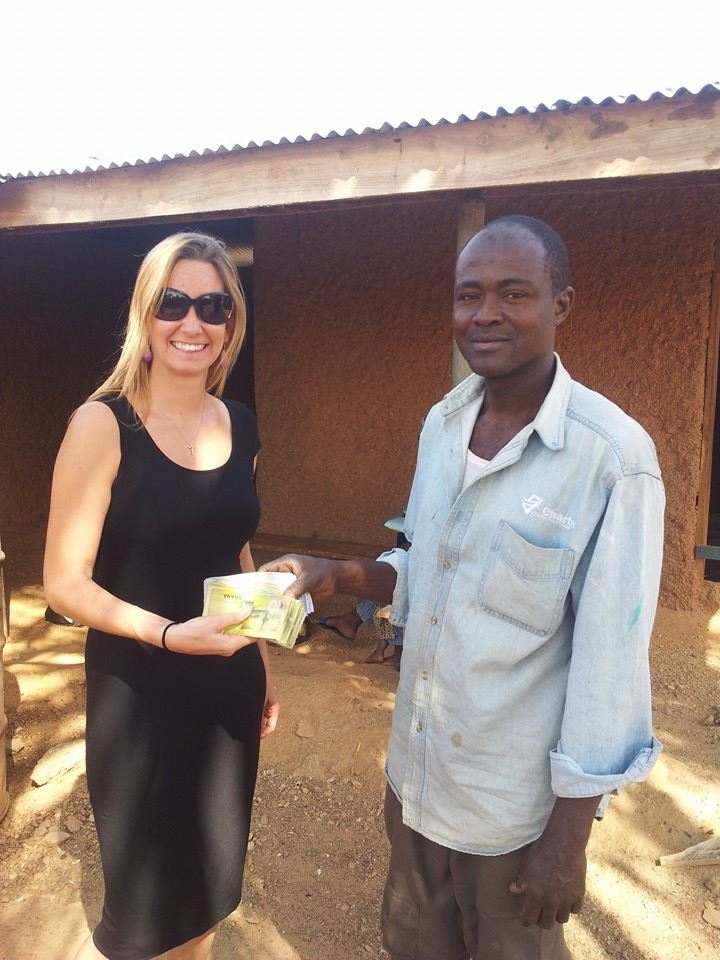 Sitting in the cool dappled shade of his courtyard, David explains that he learnt his trade in rearing pigs from his uncle at the age of 19 when he lived in the south of Ghana, in Takoradi. He has now lived in his home town Lawra in the Upper West for the past 10 years with his wife, Agnes and their six children, three of whom are away at boarding school. Agnes also has her own small business meaning David is not the only breadwinner and they combine their earnings to provide for their family. David bought some pigs to start rearing them for income nearly three years ago. He started out with 10 piglets, grew them till they were ready to breed from 6 months onwards then selected some to keep and some to sell to local butchers. He had successfully doubled his lot to 20 local breed pigs at the time that he received his ATE grant with the hope of growing his business further. Since receiving the grant from ATE, he has sold 12 of the local pigs however, 7 were either stolen or died, so now just one of the original batch is remaining.
Sitting in the cool dappled shade of his courtyard, David explains that he learnt his trade in rearing pigs from his uncle at the age of 19 when he lived in the south of Ghana, in Takoradi. He has now lived in his home town Lawra in the Upper West for the past 10 years with his wife, Agnes and their six children, three of whom are away at boarding school. Agnes also has her own small business meaning David is not the only breadwinner and they combine their earnings to provide for their family. David bought some pigs to start rearing them for income nearly three years ago. He started out with 10 piglets, grew them till they were ready to breed from 6 months onwards then selected some to keep and some to sell to local butchers. He had successfully doubled his lot to 20 local breed pigs at the time that he received his ATE grant with the hope of growing his business further. Since receiving the grant from ATE, he has sold 12 of the local pigs however, 7 were either stolen or died, so now just one of the original batch is remaining.
The ATE grant enabled David to expand his livestock so when he experienced some challenges, the additional pigs he bought helped him to cover some of the losses. He had used the grant to buy 9 long frame pigs and being a foreign breed it is reasoned that these are less easily stolen and sold on for meat as they are less common in the area and more readily identifiable to particular pig farmers like David. Through David’s account of this batch of pigs, we establish that one the long frame pigs died and 5 were sold, leaving 3 adult pigs along with 2 piglets which he had been bred in his piggery.
Despite his stock being considerably low, David explains that the ATE grant and the advice and support that he received had a positive impact on his business because now when he sells a pig which he purchased with the grant, he puts the money straight into his savings. He valued the ATE workshop which informed him about marketing and how to deal with customers as he says that working with regular customers is somewhat difficult. He has learnt the importance of getting reliable customers and being proactive in approaching them and in making opportunities to inform customers when his pigs will be grown enough to be ready for sale.
David explains that he has learnt from some mistakes that he has made in the past. In particular he recalls that he had at one time given his pigs the wrong food as he tried implementing what he had learnt from his uncle’s pig farm many years ago but it had made them sick. It is possible that this is what had caused a number of his livestock to die. David currently faces some significant risks to his pig farming business as the land on which some of the pig pens are based is not secure, plus the other area of land where pens are located is too small to expand the business. He and his family have also recently had to move as his Muslim landlord was offended by the pig rearing business which David operates and asked him to go putting him at some distance from some of the pens. David explains that the business is now at a standstill until he can accommodate his pig farm on larger more secure land.
David has some contracted carpentry work which he can rely on in the meantime. He has also started raising chickens and wants to try his hand at poultry farming which he feels could supplement earnings when the pig farming business is suffering and is considering whether poultry farming may turn out to be a more lucrative business in the long run.
Although David’s business has suffered and succumbed to certain risks faced bysmall businesses, ATE has certainly enabled it to continue. Though it is not thriving, it has not failed and David has learnt some key lessons in business which he can put into practice as he diversifies into poultry. ATE is proud to have provided David with some support and wish him every success for the future.